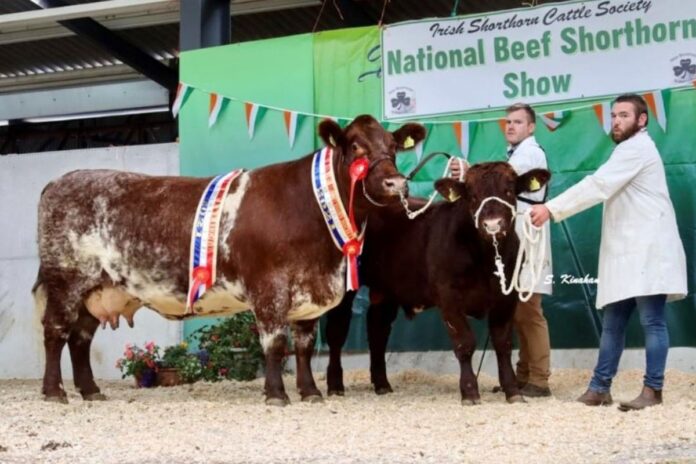A renowned, multi-prize-winning pedigree Beef Shorthorn cattle breeder is following many dairy farmers’ lead by embracing classifying to further develop his herd.
Martin Kelly of the Ricketstown Shorthorn herd owns what is understood to be the first fully classified beef herd of any breed in the Republic of Ireland.
Meurig James from Wales, on behalf of the Beef Shorthorn Society UK, visited the farm in Rathvilly, Co. Carlow, on May 14th, 2022, to undertake the process.
He was accompanied by Paul Boal and John Kirby from IHFA (Irish Holstein Friesian Association), which offers a classification service to breeders.
Classification provides what the society brands as an “independent, unbiased analysis of an animal’s conformation”.
Scoring for the 17-strong suckler cow herd was across 23 different categories ranging from traits including feet, rump width, breed characteristics and locomotion.

Classifying
Speaking to That’s Farming editor, Catherina Cunnane, he said:
“We felt it would be another useful tool in the pedigree world for the further development of our herd.”
“I had researched the classifying process before and had a broad-spectrum view of what was to come. The process took approximately 2 hours from start to finish for our 17 cows and 1 stock bull.”
“Results were instant as all data was collected upon scoring and collated on a database. Therefore, there was no wait time on results.”
“We were very pleased with our rankings; 80% of our herd were classified as VG (Very Good) or Ex (Excellent).”
Their highest score was their stock bull, Hildaland Laird, scoring an EX 94, and the classifier allocated the lowest score to a 23-month-old calved cow-heifer, Ricketstown Lovely Priya, scoring GP 82.
The possible rankings range from poor to excellent, which is appended to the animal’s name and made visible on pedigree certificates and sale catalogues.

Breeding programme
Kelly is confident that the results will bear some influence on his breeding programme, with a consistent focus on “always raising the bar” when it comes to quality.
“To a degree, this will influence breeding decisions. However, with all EBV’s/classifications, the eye is still very much part of the breeding process.”
“However, a potential stock bull with an EX 90 dam, for example, would be more appealing than a G 77,” Kelly added.
“I would encourage other pedigree breeders to consider this classifying process. It gives you a good insight into how functional the animal is. Therefore, it gives you a better knowledge of your own herd.”
“It is also beneficial for the purpose of a sale where it is not always possible to view the animal on-farm. However, thanks to the classifying process, a potential buyer can view the animals’ credentials with confidence.”

Family history and 40th-anniversary
Ricketstown Shorthorns traces its roots back to 1982 when Martin’s parents, Pj, and Carmel Kelly, founded the herd.
John Farrell, Carmel’s father, who worked successfully with the Shorthorn breed since the 1930s, influenced Ricketstown Shorthorn’s establishment.
Martin said: “I am sure my grandfather, John Farrell, would be proud to see us carrying on the tradition. 2022 marks the 40th year of Ricketstown Shorthorns and we will celebrate in autumn 2022 with an anniversary production sale.”
The family originally had dual-purpose Shorthorns, and when moving to suckling from a milking operation, they decided to venture into a beef enterprise.
When the importation ban was lifted, they imported Beef Shorthorns from the UK.
Martin concluded: “Not only were we the first herd in Ireland to import from the UK in over 40 years, but it also gave us the opportunity to enhance our genetic pool.”
To share your story, email – [email protected]





